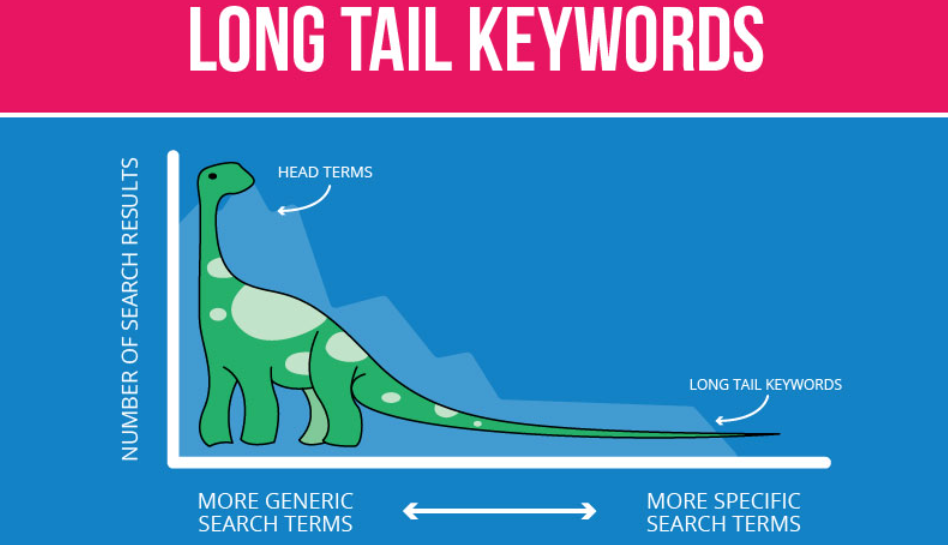Long-tailed keywords.
Have you ever wondered why some content just seems to connect perfectly with what you’re looking for online? Often, these pieces are powered by something called long-tail keywords. These are longer and more specific phrases that searchers are likely to use when they’re closer to a point of purchase or when they’re using voice search.
Research shows that these more detailed queries have less competition yet often lead to higher conversion rates. They are niche-specific, which means fewer websites compete for them, and they match particular user queries more closely.
Using long-tail keywords is about tuning into the searcher’s intent. When I recommend their use, I’m advocating for a move towards precision in understanding what my readers need, when, and how they phrase it. These keywords can often match whole questions or very specific topics, making them highly relevant for those seeking detailed information.
In an evolving digital landscape, where voice search and conversational AI are becoming more prevalent, long-tail keywords are only growing in importance. They mimic the way people talk and ask questions in real life, fitting seamlessly with natural language processing technology that powers devices like smart speakers and smartphones.
If you’ve ever asked your device a long, detailed question, the answer you received was probably informed by long-tail SEO practices. As a result, content that effectively employs long-tail keywords offers the kind of user experience that Google aims to reward: one that’s targeted, helpful, and thoroughly satisfying.
To find your best long-tailed keyword you need the correct Keyword Research tools, and here are my favorite “Key Word Research Tools”
The Strategic Advantage of Long-Tail Keywords for SEO
Google always seems to have an uncanny knack for giving you exactly what you’re searching for That’s no fluke. Google’s algorithms are very keen on matching search queries with the most relevant and satisfying results. It’s part of why long-tail keywords are not only useful but strategic for search engine optimization (SEO).
Let me walk you through some concrete examples. Imagine that a blog optimized for the long-tail keyword ‘organic handcrafted chocolate bars’ starts ranking. It’s specific, and while it might draw in less traffic than ‘chocolate bars,’ the visitors it attracts are closer to making a purchase. They know what they want and they’ve typed that into Google, which is now pointing them straight to that blog.
Integrating long-tail keywords isn’t just throwing them into your content and hoping for the best. The clever part is weaving these keywords into a broader SEO and content marketing strategy. This could involve creating dedicated pages for specific long-tail keywords or crafting informative blog posts that answer complex queries connected to these keywords.
Better SERP rankings are in the cards for content that effectively targets long-tail keywords. This is because Google respects content that clearly answers a specific question. Such content usually enjoys lower bounce rates, as it’s tailored to fulfill the searcher’s needs. The more niche the keyword, the less competition there is, and the higher the chances of your content taking one of those top spots on Google’s search results page.
After all, Google’s endgame is user satisfaction. Leveraging long-tail keywords helps in sculpting content that scratches a particular itch. By focusing on specificity and relevancy, content creators can better satisfy the nuanced demands of their audience, which in turn signals to Google the worthiness of a website to rank highly.
And if you are using Google ads, this information may be a game changer for you.
 Implementing Long-Tail Keywords
Implementing Long-Tail Keywords
Best Practices for Content Creators
I believe your takeaway should be a clear set of practices for using long-tail keywords effectively in content creation. First thing’s first: to find the right long-tail keywords, use keyword research tools suited to your business niche. Aim for phrases with lower competition but a high relevance to your target audience.
Once you’ve picked your keywords, focus on weaving them into your content in a way that feels natural and adds value for your readers. Avoid the temptation to stuff your articles with keywords; always prioritize readability and providing answers to your audience’s questions.
It’s essential to keep an eye on how these keywords perform on your site. Use analytics tools to track traffic, engagement, and conversions stemming from content that includes long-tail keywords. This data will help you refine your strategy and focus on what truly resonates with your audience.
Finally, remember that your ultimate goal is to build trust with your readers through high-quality content that addresses their needs. Long-tail keywords are merely a tool to achieve this end—they help users find your content when they’re searching for specific information. They’re most effective when used as part of a genuine effort to educate and assist. Stick to this approach, and I’m confident you’ll see the value of integrating long-tail keywords into your content strategy.
Also, look at my post “Fat Joe and long Tailed Keywords”
Final Words.
Hopefully, this has given you food for thought. Using long-tailed keywords puts you directly in front of people with specific requests. And if you solve their problem you are in a great position as a trusted source of information.
Interested and want to turn your free time into a side hustle or even a full-time venture, check me out at the platform I call home with over 2 million members. This is not a get-rich-quick scheme and like any business, the rewards reflect the hours and effort put in. This platform is called Wealthy Affiliate and I wake up thankful every day that I found these truly amazing people.
Steve and Wealthy Affiliate

Any or all links on this site may be affiliate links, and if you purchase something through those links I will make a small commission on them.
There will be no extra cost to you and at times due to my affiliation, you could actually save money.
You can read our full affiliate disclosure here.

